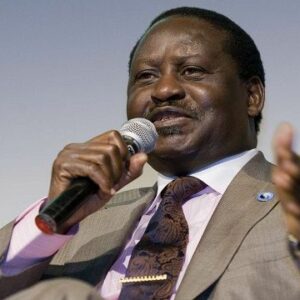Kenyan businessman and politician Raila Odinga is frequently considered as the country’s father of democracy. Raila was born into a family of political activists; his father was Kenya’s first Vice President. After completing his schooling in Germany, he returned to Kenya, where he began a teaching profession while also engaging in a number of mechanical engineering-related business projects. Later, he himself would become interested in politics. He was one of the most famous advocates for political reform in Kenya, particularly for multi-party democracy as opposed to the country’s conventional one-party politics. Multiple times, he would serve time in prison for similar crimes, including a six-year sentence, and he would get numerous death threats. After his final incarceration, he would ascend the Kenyan political ladder by creating and merging many political parties and running for president multiple times. Although he lost every presidential race he stood for, he finally became the country’s second-ever Prime Minister and was able to affect political change through this role.
Youth and Early Life
Raila Amolo Odinga was born January 7, 1945 in Maseno, Kenya to Mary Ajuma Odinga and Jaramogi Oginga Odinga.
He attended ‘Kisumu Union Primary School,’ ‘Maranda Primary,’ and ‘Maranda High School’ for his secondary school.
He spent two years at the Herder Institut, part of the University of Leipzig in East Germany, beginning in 1962. Then, he received a scholarship to attend the “Technical School” in Magdeburg, East Germany, from which he graduated in 1970 with a degree in Mechanical engineering.
Raila Odinga’s Career
After completing his graduate studies in 1970, Raila returned to Kenya and began teaching at ‘The University of Nairobi’
While he was still teaching at the University of Nairobi in 1971, he founded the firm that would become East African Spectre Ltd., a manufacturer of liquid petroleum gas cylinders.
In 1974, he left the University of Nairobi and began working as a group standards manager for the Kenya Bureau of Standards. He was elevated to Deputy Director of the ‘Kenya Bureau of Standards four years later.
In 1982, he was suspected of conspiring with those who attempted a failed coup against the president. He was accused of treason and imprisoned for six years without trial.
In September 1988, shortly after his release, he was re-arrested for his engagement with campaigners campaigning for multi-party democracy in Kenya.
On June 12, 1989, he was freed from prison, but a year later he was imprisoned again.
On June 21, 1991, he was released from prison, and in October he departed Kenya for Norway. The assassination threats he claimed to have received from the Kenyan government likely influenced his choice to leave his country of birth.
He returned to Kenya in 1992 and joined the Forum for the Restoration of Democracy (FORD). He was chosen Vice Chairman of the “Ford General Purposes Committee.”
In 1992, ‘FORD’ broke into two factions commanded by Raila’s father (‘FORD-Kenya’) and Kenneth Matiba (‘FORD-Asili’). Raila was appointed FORD-Deputy Kenya’s Director of Elections. In the same year, he earned a seat in Parliament and became renowned as one of the country’s founding fathers of multi-party democracy.
In the 1997 General Election, he ran for President but finished third, retaining his position in Parliament. After the election, he began to support President Moi’s administration and led a merger between his party and the ‘KANU’ party of President Moi.
From June 2001 to June 2002, he served as Energy Minister in President Moi’s cabinet. In the same year, he was also elected secretary-general of the KANU party.
In opposition to President Moi’s selection of the presidential candidate in 2002, Raila left KANU and founded the Liberal Democratic Party. This party subsequently joined forces with the “National Alliance of Kenya” to establish the “National Rainbow Coalition.” He was appointed minister of roads, public works, and housing in the new President’s government later in the year.
In 2005, following a political scandal, the President reassembled his cabinet without Odinga and his allies, prompting him to join a new coalition, the ‘Orange Democratic Movement’
In 2007, Raila ran for president for a second time and nearly lost. He contested the outcome, causing considerable bloodshed and unrest.
As a result of the violence that followed the 2007 election, former UN Secretary-General Kofi Annan intervened and helped Odinga and the President negotiate an agreement to form a coalition government; Odinga was sworn in as Prime Minister on April 17, 2008.
In 2013, he ran for president once more and nearly lost. Initially contesting the results, he relented after the Supreme Court upheld them.
Raila’s Major Opera
His autobiography documenting his life and battles, The Flame of Freedom, was published in October 2013. It is his sole publication.
Awards & Achievements
In 2008, Raila received an honorary Doctor of Laws from Kenya’s “University of Nairobi.”
In 2012, he received an honorary degree from Florida A&M University in the United States.
Personal History and Legacy
He married Ida in 1973, and the family currently resides in Karen, Nairobi. Fidel, Rosemary, Raila Jr., and Winnie are their four children.
In 2010-2011, he was assigned to mediate the Ivorian crisis, which entailed severe violence following the Ivory Coast elections.
In 2010, he worked closely with President Kibaki to pass a new constitution for Kenya that returned some presidential power to the level of local government.
Estimated Net Worth
Raila is one of Kenya’s wealthiest men. His estimated net worth is approximately $30,000,000 based on his investments in businesses such as ‘Pan African Petroleum Ltd.’ and ‘East Africa Spectre Ltd.’
Trivia
This prominent politician has various nicknames, including “the Mysterious One,” which is “Agwambo.”
Obama’s paternal grandfather was from the same Kenyan village as Odinga.


